Maryland Legislation to Expand Community Solar, Establish Battery Pilot is Poised for Passage

Both chambers of the Maryland legislature passed two bills on March 29, which seek to expand community solar and incentivize energy storage pilot programs in the state.
House Bill 650 was proposed by Democratic Delegate Marc Korman on February 6 and requires the Public Service Commission to establish an energy storage pilot program by June 1. The pilot projects will be between 5 and 10 megawatts, with a minimum of 15 megawatt-hours. The state’s investor-owned utilities will be required to solicit offers to develop energy storage projects under four different commercial and regulatory models:
- A utility-only model under which the electric company owns and operates the project exclusively.
- A utility and third-party model, where the utility owns the project for grid reliability while a third-party operates the project in wholesale markets when it’s not providing grid services.
- A third-party ownership model, in which the electric company contracts with a project owned by a third-party for grid reliability services.
- A “virtual power plant” model under which the utility aggregates or uses a third-party aggregator to receive grid services from distributed energy storage projects owned by customers or a third party.
The bill sets a due date of April 15, 2020 for the first application and September 15, 2020 for the second.
Lawmakers also passed House Bill 683, which was introduced by Democratic Delegate Luke Clippinger on February 7. It would extend the state’s community solar pilot through 2024 and remove the limit on the maximum number of subscribers in the program. The legislation would also include annually increasing capacity levels for each program category, modifying the current requirement that allows restrictions to enable regulators to conduct a meaningful study.
Maryland established the community solar program in 2015 as a three-year pilot with a requirement to have at least two subscribers. The Public Service Commission set an upper limit of 350 accounts, allowing subscriptions above the limit only if an electric utility has an automated billing system in place.
EnerKnol Pulses like this one are powered by the EnerKnol Platform—the first comprehensive database for real-time energy policy tracking. Sign up for a free trial below for access to key regulatory data and deep industry insights across the energy spectrum.
ACCESS FREE TRIAL